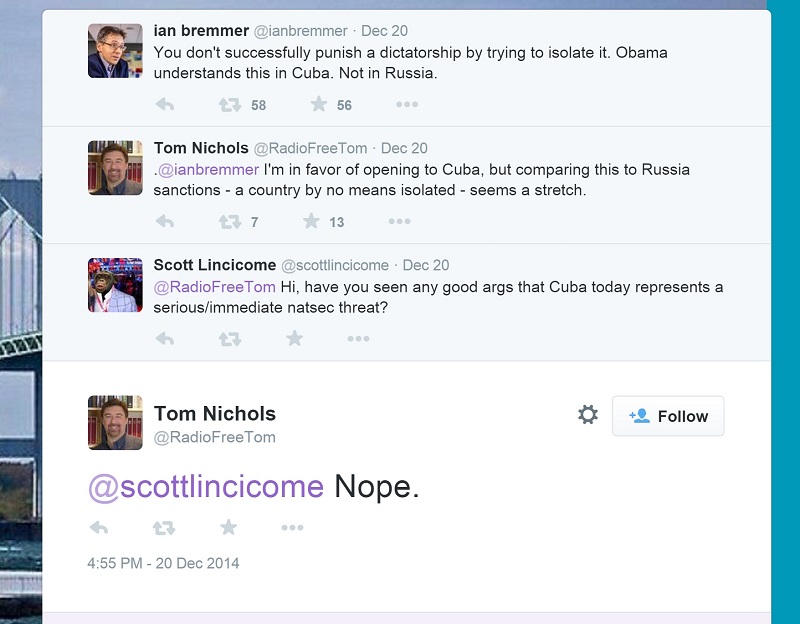
President Obama’s announcement last week that his administration will seek to normalize relations with Cuba elicited strong opposition from many freedom-loving conservatives. Several aspects of the deal—the prisoner swaps, the president’s unilateralism and rhetoric, the timing, and so on—probably warrant scrutiny and, in some cases, even scorn. But one aspect deserves support from those who stand for free markets, limited government, and individual liberty: an end to the Cuban embargo’s trade and travel restrictions.
It’s far from clear that the president’s actions will actually achieve these ends, and it’s certainly clear that the proper way to achieve them is through the legislative process. But there really can be no doubt that, as a general matter, it’s past time for the embargo to go.
Communist-hating lovers of liberty have offered myriad reasons to oppose the current Cuban embargo (see, for example, here and here), but today I want to focus on the most basic: over the last two decades, the United States government has utterly failed to justify its forcible, legislated ban on Americans’ freedom of travel, contract, and commerce. Because we live in a country of natural rights and limited, constitutional government, the state alone bears a heavy burden of proving that its restrictions on individual liberty are in fact warranted. In the case of free trade, and especially freedom of movement, this means that there is a strong presumption in favor of Americans’ right to freely travel to wherever they want, and transact with whomever they want—one that may only be overcome where the state establishes a compelling interest in prohibiting or limiting those actions.
One such compelling interest is national security, something even a hardcore free trader like Milton Friedman has acknowledged is a perfectly sound justification for trade and investment restrictions. It’s for this reason that even most libertarian free traders do not oppose, for example, multilateral attempts to isolate and impoverish rogue regimes actively seeking and spreading weapons of mass destruction.
The Cuban Embargo Has Not Changed Regimes Nor Deterred Investments
In the case of Cuban embargo, however, the federal government has failed to meet its basic burden of proof. First, legislation codifying the embargo—i.e., the “Helms-Burton” Act of 1996—has not achieved either of its two primary objectives: regime change and foreign investment deterrence. The first failed objective is manifest: the Castros remain in power and the Cuban government continues to pursue its particularly-thuggish form of authoritarian communism. The second failed objective is almost as obvious: according to a running tally by the U.S.-Cuba Trade and Economic Council, approximately 4,500 companies from over 100 countries import to, export from, provide services to, or have investments within Cuba.
A quick perusal of this tally makes clear that these companies and countries are not only from fellow Bolivarian revolutionaries like Bolivia and Venezuela or global troublemakers like Russia; they also are respected multinationals from many of America’s closest allies in North America, Europe, and Asia. Indeed, when Helms-Burton was enacted, many of these very same allies immediately refused to participate in the United States’ isolation plans and in fact actively opposed them, passing legislation preventing their companies from complying with the law.
The failure of the Helms-Burton to dislodge the Castros or deter foreign trade and investment really should come as no surprise: the last few decades are littered with examples of similarly-ambitious unilateral sanctions failing to achieve their stated economic and foreign policy objectives. It’s for this reason that the policy tool has mostly fallen out of favor in Washington (among both Republicans and Democrats) and has engendered opposition from even some of the staunchest of American foreign policy hawks. But, hey, don’t take my word for it; take Dick Cheney’s:
I am not automatically, absolutely opposed to all sanctions. I think there are occasions when an appropriate policy response by the United States is to impose sanctions on some foreign government. But those occasions are relatively few. I think in most cases they are appropriate only where we can think in terms of multilateral sanctions, when there is something of an international consensus willing to follow U.S. leadership. Under those circumstances it may make sense to pursue a sanctions policy…. But my concern today is primarily with unilateral economic sanctions imposed by the United States. I would begin by arguing that they almost never work…
When we pursue those courses of action, the United States ends up in a position of adopting and advocating a policy that is almost guaranteed to be ineffective. It makes one wonder why the United States, on purpose, would want to consistently pursue policies that don’t work. But that is what we do every time we fall back on the use of unilateral economic sanctions. They don’t produce the desired result, in part because most of the time such policies are motivated primarily by domestic political considerations, by a desire to respond to pressure from some group or other here at home.
Unilateral Sanctions Just Don’t Work
The United States has pursued unilateral economic sanctions on the Cuban regime for upwards of five decades. During a Cold War, pre-World Trade Organization (WTO) period of immobile capital, these trade and travel restrictions very likely achieved significant U.S. foreign policy and national security gains. It is extremely difficult, however, to continue to make that case given today’s economic realities. The Cuban regime trades with almost everyone (China, Canada, Europe, and Brazil are among its top export partners, to the total of about $20 billion per year); Cuban exports have recovered to pre-Cold War levels; Cuba has access to internationally-traded, fully-convertible currencies like Euros, Canadian Dollars, and Yen; Cuba is a full member of the WTO (unlike Iran, North Korea, and others); and it even conducts hundreds of millions of dollars of annual trade with the United States—yes, the United States— every year. To argue that the embargo somehow isolates the Cuban regime from anyone other than American travelers, exporters, and consumers simply defies reality.
The federal government also has proven unable to justify the Cuban embargo on broader national security grounds. Unlike Iran or North Korea, there are no indications that Cuba is seeking nuclear weapons or other weapons of mass destruction. Given the death of the Soviet Empire, is extremely hard to believe that this little, impoverished island presents an imminent and tangible threat to the United States—especially one that could be thwarted by unilateral (key word: unilateral) economic sanctions. Indeed, according to a study by the U.S. Government Accountability Office during the Bush administration, a strong argument can be made that the Cuban embargo has diverted finite government resources from other, more serious national security threats. But, again, don’t take my word for it; here’s Naval War College professor (and self-avowed commie hater) Tom Nichols:
Even the fact that Cuba remains on the State Department’s list of “State Sponsors of Terrorism” is unpersuasive. According to the most recent State Department report, “There was no indication that the Cuban government provided weapons or paramilitary training to terrorist groups,” and the report’s brief entry on Cuba stands in stark contrast to the laundry list of violations undertaken by the other countries listed: Iran, Sudan, and Syria. (In case you’re wondering, Bush administration reports were equally sparse.) The open diplomatic relations of U.S. allies, such as Australia, Canada, and the United Kingdom, with Cuba reinforce these conclusions, as does the fact that the United States’ maintains normalized economic relations with many other countries that have less-than-stellar foreign policy credentials. This certainly isn’t intended to endorse the left-wing fever dreams of a peaceful Cuban paradise, but it should call into serious question the trade and travel treatment that the United States reserves for only the worst of the world’s worst.
The United States Typically Doesn’t Restrict Travel for Human Rights Concerns
Finally, there is the issue of human rights. The United States government arguably could have justified the Cuban embargo on such grounds if not for the obvious fact that the government doesn’t restrict its citizens’ trade with, and travel to, many countries that have similar, if not worse, records on human rights and political freedoms than Cuba. Thus, the U.S. government does not, as a general policy, view basic human rights concerns as a sufficiently compelling reason to prohibit Americans’ free movement and commerce.
Indeed, the government not only has normalized trade relations with the likes of China, Eritrea, Uzbekistan, and Burma, but it is actually actively negotiating a free trade agreement (the Trans-Pacific Partnership) with Brunei and Vietnam, the latter of which was recently found to have about the same level of human rights problems as Cuba. The federal government has provided no compelling reason for this disparate treatment, and certainly hasn’t demonstrate that the embargo somehow improves human rights in Cuba. It therefore once again has failed to justify its forcible restrictions on Americans’ basic freedoms.
The repeated response to these facts is not that they are wrong, but that they fail to justify a change in the status quo—in other words, that the embargo should stay unless I and other Americans can demonstrate that free trade and travel would markedly improve the situation in Cuba or, at the very least, not make things worse. This argument, however, gets things totally backwards (although I’m certainly willing to defend the benefits of trade and engagement in almost all instances).
Americans Have the Presumption of Liberty
As noted above, in our system of natural rights and enumerated government powers, the burden falls not on American citizens to demonstrate the value of their liberty in the face of state intervention but instead squarely on the state to justify that intervention. This basic concept—this “presumption of liberty”—is relatively uncontroversial among most conservatives when it comes to government intrusions like Obamacare mandates, eminent domain, or civil asset forfeiture. It’s even well-accepted for other trade issues like sugar quotas—that government impediments to free commerce should be removed unless the state provides a legitimate and compelling reason to keep them.
When it comes to Cuba, however, a different standard emerges: the presumption inexplicably favors the state’s restriction on free trade and travel, and the citizen must demonstrate, often impossibly, that said restrictions are deleterious to not only himself but also both the United States and Cuba (and that lifting them wouldn’t make things worse). I’d expect such a position from left-wing, illiberal audiences (and even President Obama), but not from freedom-loving, Constitution-citing conservatives and libertarians.
Moreover, the argument that the United States should only lift the embargo in response to Cuban economic and foreign policy changes imposes a nonsensical reciprocal element on what is clearly a unilateral issue. The United States government need not wait for another country to act before it expands the liberty and well-being of its own citizens. In this way, policy changes that enhance individual liberty (like free trade) differ entirely from the reciprocal, zero-sum world of prisoner swaps or territorial shifts. The removal of trade and travel restrictions is valuable regardless of what any other country says or does, especially a tiny, tinpot dictatorship. To argue otherwise is essentially to advocate “Blazing Saddles” policy—i.e., “if you don’t stop hurting your citizens, I won’t stop hurting mine.” No, thanks.
Leaving all other issues—such as the foreign policy and human rights benefits of free trade and international engagement, or whether the embargo has provided the Cuban regime with a ready excuse for its failed socialist experiment—aside, the state’s failure to rebut the basic presumption of liberty demands a change to current policy. The United States government, through Helms-Burton, has had 18 years to prove that its codified ban on Americans’ rights to freely trade and travel have achieved the law’s stated economic and foreign policy objectives. The government has had 18 years to demonstrate that Cuba is a manifest national security threat or that its human rights violations are different from, and somehow worse than, those of countries with whom we have normalized relations. The government has made no such demonstrations, and has thus failed to justify the embargo on any legitimate grounds. As such, it’s clearly time for a (legislatively enacted, constitutionally-proper) change.










